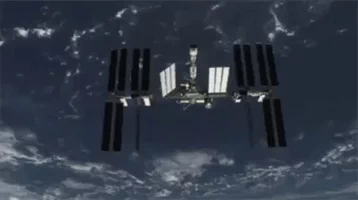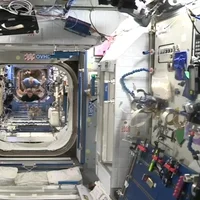By Will Collette

For the first time in a while, we are getting a nice six-minute International Space Station flyover and a "mostly clear" sky at the same time. I have not posted notices when the weather forecast was poor even though we have had several 6 and 7 minute maximum length overflights.
Normally, I make some remark that celestial mechanics that makes overflight times and locations something you can count on.
Normally, I make some remark that celestial mechanics that makes overflight times and locations something you can count on.
However, there was a mishap yesterday when a new Russian module docked with the station and then somehow, its booster rockets ignited, pushing the station out of position. The crew managed to regain control after a hectic one hour of trouble.
The incident is still under investigation and the crew has been looking to see if there was any damage (none reported so far).
NASA has indefinitely postponed the launch of Boeing's new un-crewed Starliner capsule which was supposed to head up to the ISS.
Anyway, for the first time in the 10 years I have been posting notice of Charlestown overflights, I am not 100% sure how precise this NASA e-mail is:
Time: Fri Jul 30 9:03 PM, Visible: 6 min, Max Height: 48°,
Appears: 10° above NW, Disappears: 14° above ESE
Based on the current "mostly clear" weather report after a mostly sunny day from the National Weather Service, you should be able to watch the International Space Station fly over Charlestown tonight at 9:03 PM (more or less, considering yesterday's incident).
 This overflight will last six minutes, the amount of time the station catches enough of the sunlight over the bend of the horizon to be visible to us on the ground in Charlestown.
This overflight will last six minutes, the amount of time the station catches enough of the sunlight over the bend of the horizon to be visible to us on the ground in Charlestown. Six, sometimes seven, minutes of visibility is the maximum.
I enjoy the quiet serenity of our ONLY manned presence in space as it passes over our tiny patch of the planet.